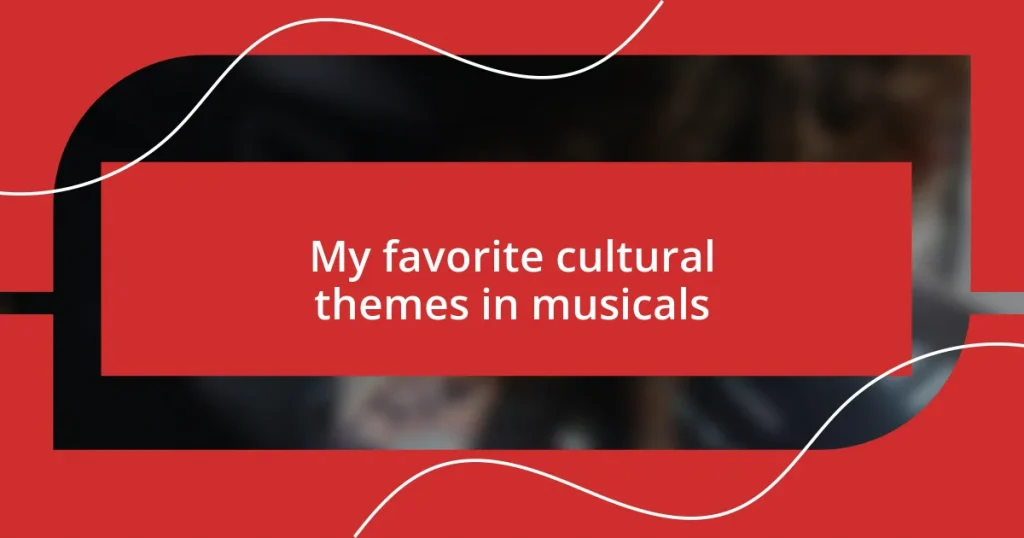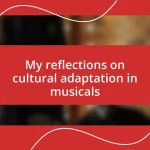Key takeaways:
- Musicals often explore deep cultural themes such as class differences, the immigrant experience, and representation of diverse communities, igniting conversations on identity and societal values.
- The impact of cultural influences on musicals can transform storytelling, as seen in productions like “The Lion King” and “West Side Story,” enhancing authenticity and relevance.
- Emotional resonance in musicals enables audiences to connect personal experiences with broader cultural narratives, fostering empathy and self-reflection through storytelling.
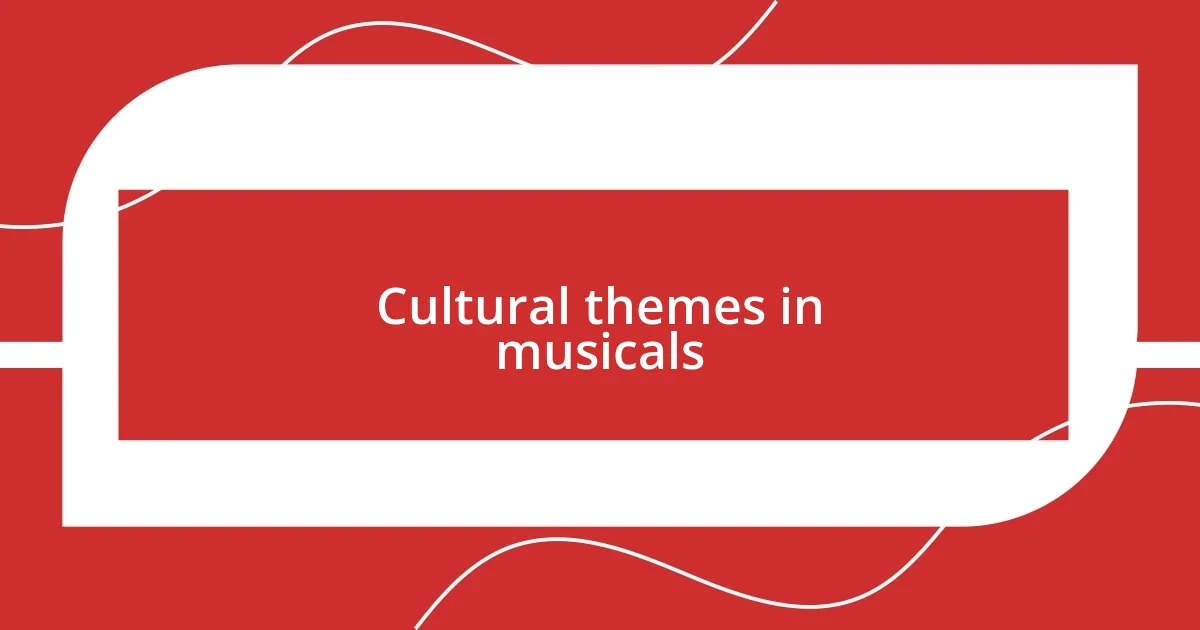
Cultural themes in musicals
Cultural themes in musicals often reflect the intricacies of societal dynamics. For instance, I vividly remember watching “In the Heights” for the first time. The way it portrayed the struggles and dreams of the Latino community felt so relatable; I found myself pondering how culture shapes our identities and aspirations.
One of the most powerful cultural themes is the exploration of class differences. I think back to “Les Misérables,” where the stark contrast between the wealthy and the impoverished led me to question our societal values. Isn’t it interesting how a musical can ignite such deep conversations about social justice and empathy simply through song and storytelling?
Additionally, musicals frequently highlight the immigrant experience, showcasing the hope and hardship that comes with it. I recall the emotional weight of “Come From Away,” where the stories of acceptance and goodwill amidst chaos resonated deeply with me. Have you ever felt that surge of hope when a cultural theme strikes a personal chord? It’s those moments that truly make musicals impactful and memorable.
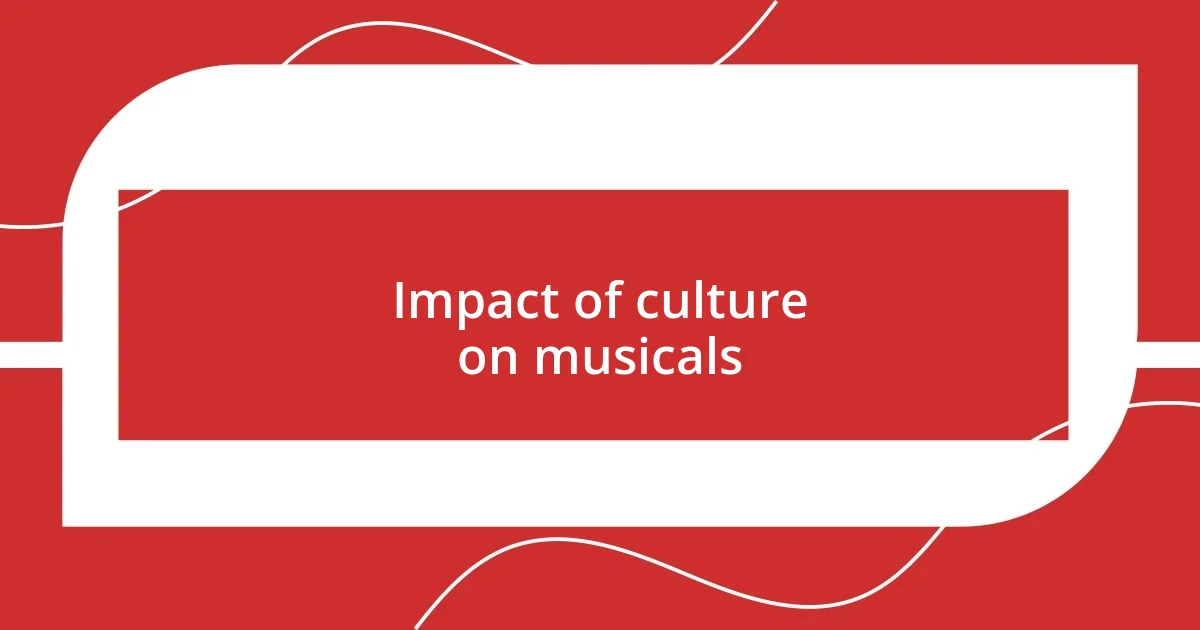
Impact of culture on musicals
The influence of culture on musicals can be transformative, often drawing from deep-rooted traditions and contemporary issues. For example, when I experienced “The Lion King,” the rich African heritage infused in the music and dance fascinated me. It created a vivid tapestry that opened my eyes to the beauty of storytelling influenced by culture. It’s remarkable how these elements can transport us while fostering appreciation and understanding of diverse backgrounds.
Moreover, culture impacts not only the content but also the production of musicals. I’ll never forget witnessing a bilingual performance of “West Side Story.” The integration of English and Spanish brought a new dimension to the narrative, making it feel more authentic and relevant to today’s multicultural society. Isn’t it fascinating how a single twist in presentation can offer fresh insights into an age-old story?
However, the real magic happens when personal experiences and cultural themes intersect within a musical. I recall attending a local production of “Rent,” where the performers infused their own experiences into the characters. Their personal stories of love, loss, and resilience made the performance resonate on a deeper level. This connection between lived experiences and cultural representation is what keeps me coming back for more, continually prompting reflection on my own identity and place in the world.
| Cultural Influence | Example Musical |
|---|---|
| Rich Traditions | The Lion King |
| Bilingual Narratives | West Side Story |
| Personal Experiences | Rent |
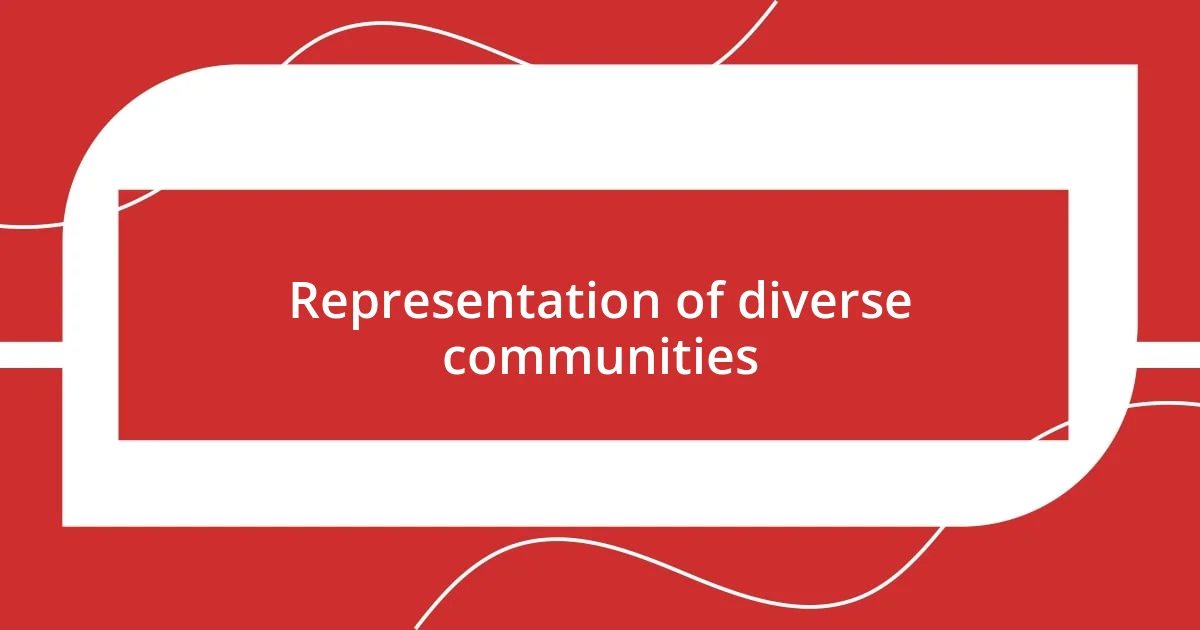
Representation of diverse communities
The representation of diverse communities in musicals is crucial for fostering understanding and empathy. I remember the first time I watched “Allegiance” and how it brought to life the Japanese American experience during World War II. The emotional stories of resilience amidst such injustice are unforgettable, reminding me of the importance of honoring diverse narratives that are often left untold.
- Musicals can serve as a mirror to see ourselves in the stories of others, emphasizing our shared humanity.
- The portrayal of LGBTQ+ communities has evolved, with shows like “Fun Home” inspiring personal conversations about identity and acceptance.
- I was particularly moved by the powerful depiction of Black culture in “Hamilton,” which redefined historical narratives and showcased the richness of diverse voices.
The impact of these representations extends beyond performance, resonating deeply with audiences. After watching “Aida,” I found myself reflecting on themes of love, sacrifice, and cultural heritage in my own life. It’s incredible how a simple musical can spark such profound self-exploration and connection to the broader world around us.

Historical influences in musical theater
When I think about the historical influences in musical theater, I can’t help but reflect on the evolution of storytelling itself. For instance, the roots of American musical theater can be traced back to traditions like vaudeville and minstrel shows. These earlier forms, despite their problematic aspects, laid down the foundation for the vibrant, eclectic styles we see today. It’s fascinating how these forms evolved, isn’t it? They shaped not just the genre but also the ways we perceive and enjoy a performance.
In my experience, a musical like “Les Misérables” beautifully exemplifies the historical context in which it was created. The French Revolution serves not only as a backdrop but informs the characters’ struggles and ambitions, pulling us into a world of political turmoil and sacrifice. I remember feeling an overwhelming sense of empathy for Jean Valjean and his fight against societal injustices. This moment reinforced for me how deeply history can resonate within a show and move us to reflect on our own societal realities.
Looking at more contemporary works, I find the influence of historical events like the Stonewall Riots in “Hedwig and the Angry Inch” compelling. The show not only captures the struggles of the LGBTQ+ community but also serves as a reminder of the resilience born from such pivotal moments in history. It invites profound contemplation on how history, often accompanied by pain and triumph, informs our cultural narratives today. In what ways do you think our understanding of these events shapes our identities and perspectives?
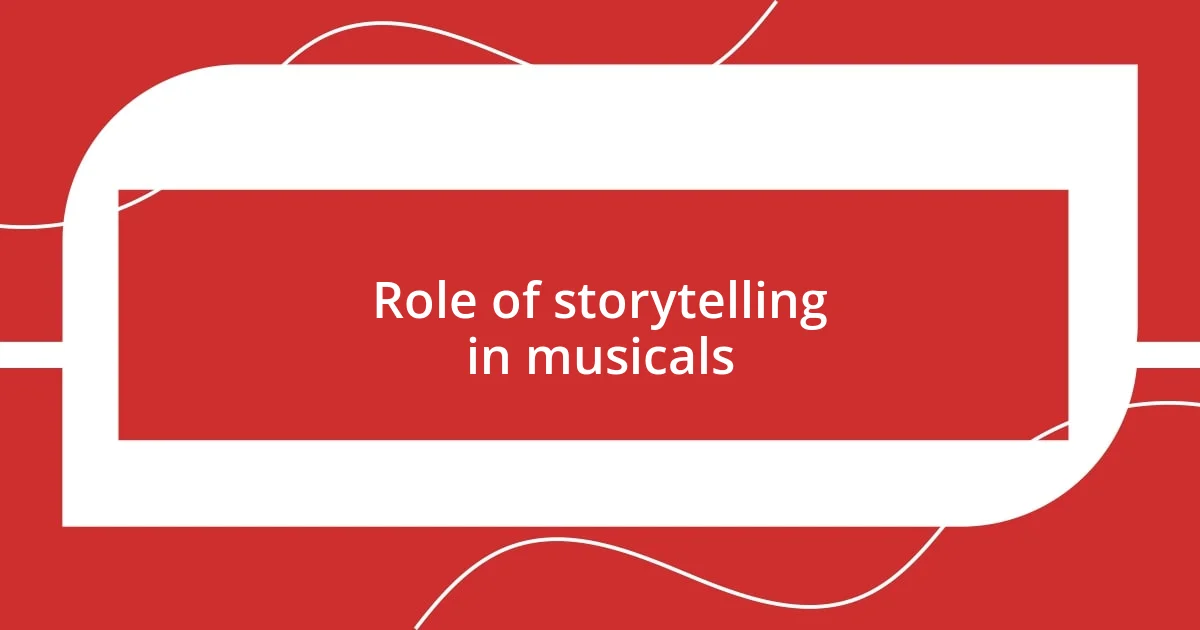
Role of storytelling in musicals
Storytelling is the backbone of musicals, weaving together emotions, plot, and character in a way that resonates with audiences. I recall the first time I saw “The Phantom of the Opera.” The narrative’s haunting love story captivated me, pulling me into an emotional journey that felt almost personal. It wasn’t just about the music; it was the way that story unfolded—the tension, the longing, and ultimately, the tragedy—that made it such a memorable experience.
Through storytelling, musicals illuminate complex themes and delve into the human experience. Take “Dear Evan Hansen,” for instance; the plot touches on mental health and the desire for connection. The moments where Evan grapples with his identity and seeks acceptance mirrored my own teenage struggles. It sparked conversations with friends who felt the same, highlighting how powerful storytelling can create a shared experience and foster understanding in a way that statistics or lectures often fail to do.
What I find particularly compelling is how musicals often challenge societal norms through their storytelling. When I watched “Rent,” I was struck by its unflinching portrayal of love, loss, and the harsh realities of life, especially within the LGBTQ+ community. The characters were beautifully flawed, making their stories relatable and real. Isn’t it remarkable how a story set in the late ’90s can still echo the challenges of today? It’s a testament to the timelessness of good storytelling in musicals, allowing us to reflect on our own lives while navigating universal themes.
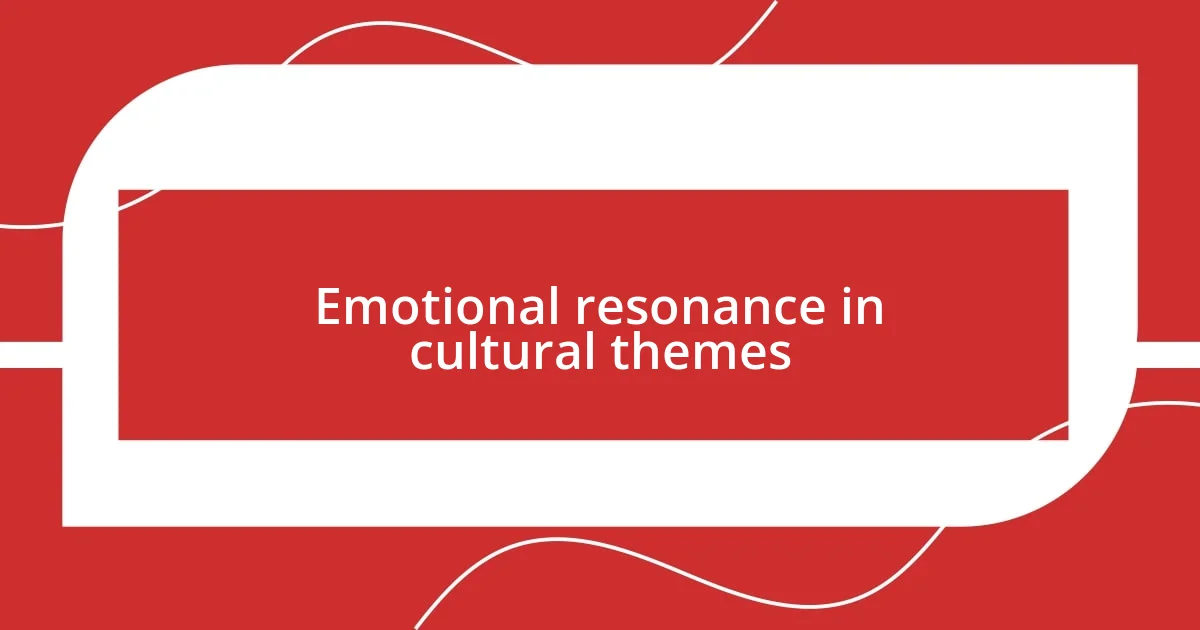
Emotional resonance in cultural themes
I find emotional resonance in cultural themes to be a powerful aspect of musicals. Take, for instance, “The Color Purple.” The raw emotions portrayed through the characters’ struggles with love and identity struck a chord within me. I remember feeling my heart ache for Celie as she navigated such deep-seated pain. Moments like this remind me how cultural narratives can evoke such strong feelings that linger long after the curtain falls.
There’s something almost electric about hearing a beloved song that reflects one’s own experiences, particularly in shows like “Come From Away.” When the townsfolk welcome stranded passengers during 9/11, it brings to life themes of kindness and humanity in the face of fear. I couldn’t help but reflect on times in my life when unexpected kindness made all the difference. Have you ever felt that rush of connection when your experiences and emotions are mirrored on stage? I certainly have, and it strengthens the bond between audiences and creators.
When I consider emotional themes in musicals, I can’t overlook “In the Heights” and its celebration of community. The way it captures the hustle, dreams, and struggles of the Latinx community resonates with anyone who’s felt the weight of their background. I recall thinking about my own heritage and how it shaped my aspirations. Isn’t it fascinating how these poignant cultural themes can spark individual reflections while simultaneously connecting us to broader narratives? That’s the beauty of emotional resonance; it pulls us into shared experiences while also prompting us to explore our own stories.
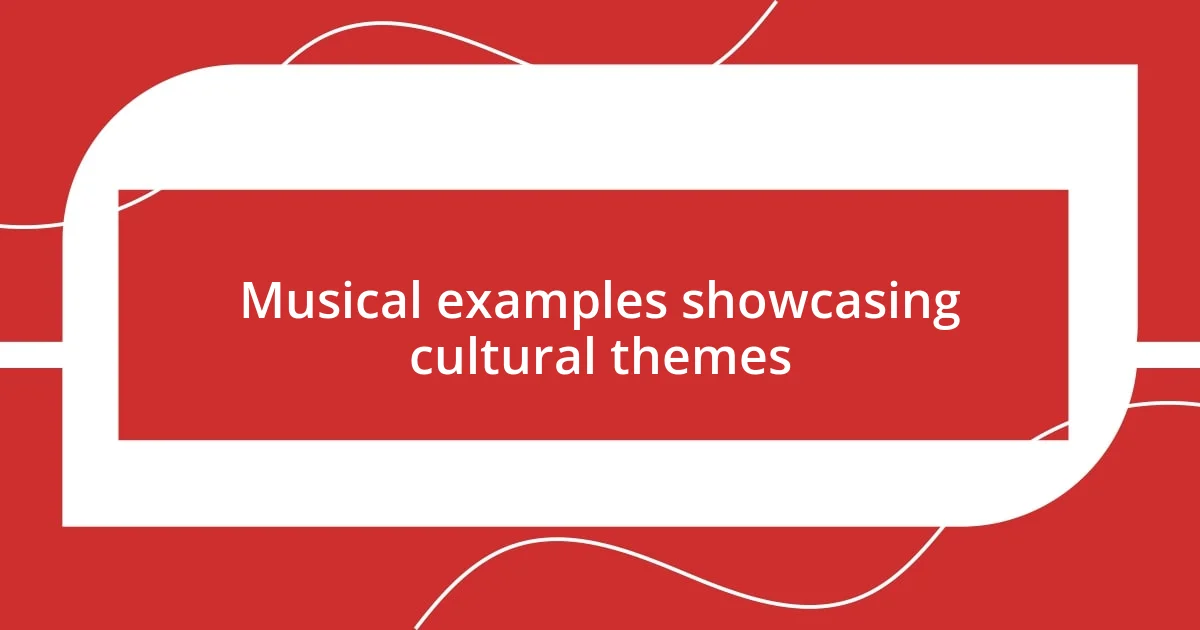
Musical examples showcasing cultural themes
When I think of musicals that shine a light on cultural themes, “Fiddler on the Roof” stands out for its exploration of tradition and change. The story offers a glimpse into Jewish life in Russia, capturing how deeply entrenched customs can clash with personal desires. I remember feeling a pang of recognition when Tevye grappled with his daughters’ choices, as it mirrored my own experiences with family expectations. Doesn’t it just remind you of those moments when you have to balance love for your heritage with your own dreams?
“Miss Saigon” serves as another poignant example, delving into the cultural impacts of war and colonization. The love story between Kim and Chris unfolds against the backdrop of the Vietnam War, highlighting the complexities of cultural identity and sacrifice. I found myself reflecting on how personal relationships can be affected by larger historical forces, something I think many people can relate to in varying degrees. Have you ever considered how your own relationships are shaped by cultural contexts?










